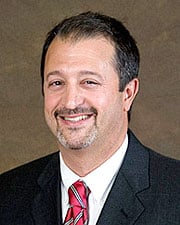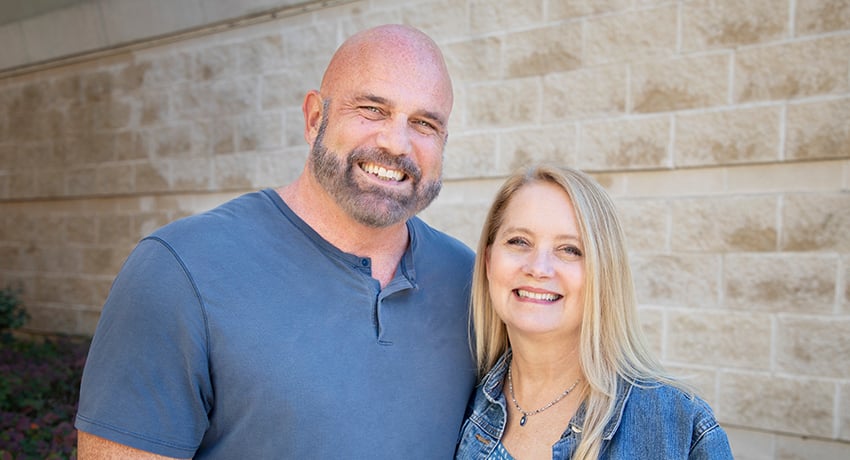Although she couldn’t quite place what was wrong, Laura Shook knew something wasn’t right with her body. Upon hearing the grave cancer diagnosis of beloved actress Farrah Fawcett, her concerns grew. She knew it was time to seek out professional help.
Searching for answers
Shook’s anxiety stemmed from occasional bright red rectal bleeding that, for a while, she had convinced herself was the result of hemorrhoids. Determined to put her fears to rest, she scheduled an appointment with a gastroenterologist.
“I booked an appointment at an office that was out of the way from my home and work. I was embarrassed and wanted to go somewhere where no one would know me,” admitted Shook.
After tests and scans had been completed, Shook was shocked to learn her concerns were founded in truth. Her diagnosis was stage 3 colorectal cancer.
“Obviously, you’re in shock at first. I was never sick and I was so young — how could I have cancer?” she said.
Her thoughts spiraled, thinking about all the wonderful upcoming events her family was planning and how this would ruin each one of them. Instead of her daughter’s graduation being a proud and happy moment, she worried her cancer would take over the day.
Shook was only 46 years old and had no family history of colorectal cancer. No one in her life understood exactly what she was going through and what her journey ahead would look like.
Finding care
Shook knew she needed to seek out the help of a surgeon. After calling around for recommendations, one name kept coming up — Joseph R. Cali, MD.
Their first meeting was, admittedly, the most nerve-wracking moment; having to openly discuss how serious Shook’s condition was and what could be done to save her life. However, Cali was able to put both Shook and her husband, Mark, at ease.
“He reviewed my CT scan and spent over an hour with us answering every question we could possibly think of to ask,” she said. “It was so kind of him to sit down and take the time with us.”
Cali, a colorectal surgeon with UT Physicians, then devised a tailored treatment plan that was best for Shook and her situation.
“Laura’s tumor had grown into the wall of her rectum and three lymph nodes,” said Cali, assistant professor in the Department of Surgery at McGovern Medical School at UTHealth Houston. “Because of this, we decided to shrink her cancer prior to surgery.”

To reduce the size of her tumor, Cali prescribed several rounds of chemotherapy and radiation and additional care from an oncologist and radiation oncologist. Shook recalls her first treatment appointment as surreal.
“To set the tone of my first day, my friend had given me these cute socks and a sweatband. All I can remember thinking is this is the start of the battle,” she said. “I knew we were going to kill this thing.”
Shook underwent six weeks of oral chemotherapy medication and daily radiation treatments. Her side effects ranged from stomach illness to extreme fatigue. Although this time was difficult, she witnessed the insurmountable love and care from her family and friends.
“It’s very humbling to be the one receiving care because as a mom and leader in my church, I’m always the caregiver,” she shared. “I can’t imagine how hard it was for everyone around me, but it was incredible to be surrounded by so many people stepping up and loving us through it all.”
With her tumor successfully minimized, it was time for surgical intervention. Arriving at the hospital, Shook again had the same feeling as the one on her first day of treatment — it was time for another battle.
Although her surgery was only a few hours, her total recovery took several months.
“Laura had a smooth recovery in the hospital,” said Cali. “We did place an ileostomy to help let her surgical area heal.”
An ileostomy is a bag that collects a person’s waste through the small intestine, rather than passing through the large intestine and out their body through the rectum. Once Shook had time to recover, Cali reversed the ileostomy.
Helping others
During her entire journey with cancer, Shook chronicled her experience in an online blog.
“Writing has always been a way for me to process things that are happening, and I kept a journal for years, so it felt natural to me,” she said.
Rather than explain and relive her sometimes difficult days to family and friends, they could just read it online.
“Having to answer questions over and over again, you feel exposed. You feel like you can’t say it another time,” shared Shook.
The thought of turning it into a book didn’t cross her mind until her remission. Several of her readers brought up how helpful it could be to others. Between recovery, leading alongside her husband at church, and family, Shook’s plate was full. As a result, she did what she always did when faced with a decision this big — she prayed.
“I remember praying to God and asking Him to let me know clearly that this was something He thought I should do, and I just left it in His hands,” she said.
It wasn’t until a celebration for her son’s book debut that she received the sign she was looking for. While out to dinner with her son and his editor, her blog came up in conversation. Intrigued by the idea of someone chronicling their journey through such a difficult time, the editor offered Shook a contract. While she did admittedly think the whole situation was odd, she thought back to her prayer and knew this was the sign.
With a bit of editing and time, Shook published her first book, “Forever Hope: Choosing Life Through Cancer and Recovery.”
“One of the best parts of this whole experience has been the fact that I could help others,” she said. “I’ve had people tell me the book helped them understand what family members have gone through or it even helped them to process their own feelings about their cancer diagnosis.”
Remission
Shook is currently in her 12th year of remission and is feeling better than ever. Every March for National Colorectal Cancer Awareness Month, she uses every platform to encourage others to get screened, including her children.
“Laura has been a wonderful advocate for colorectal cancer awareness and I’m so glad others can read about her story,” said Cali.
When asked what’s the one thing she would tell others who have received a similar diagnosis, it’s a simple response.
“You hear the word cancer, don’t automatically think that’s the end. You have so much ahead of you and life to live,” said Shook. “There’s always hope.”



